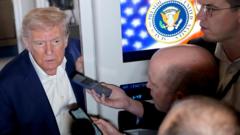US President Donald Trump has recently announced a major revision to tariff policies that will exempt smartphones, computers, and various electronic devices from hefty trade tariffs on Chinese imports. This exclusion marks an essential adjustment in Trump's trade strategy, with US Customs and Border Protection confirming the decision in a formal notice.
During a flight to Miami, Trump hinted at providing more precise details about these exemptions early next week, stating, “We’re taking in a lot of money,” signifying the significant financial implications of this move. Analysts suggest this could provide crucial relief as it directly addresses concerns raised by major tech companies about potential price surges on gadgets sourced from China.
The exemption encompasses not only smartphones and computers but also extends to semiconductors, solar cells, and memory cards. Industry analysts, such as Dan Ives from Wedbush Securities, characterized this development as a “game-changer,” which would significantly affect tech market dynamics. Leading tech giants like Apple, Nvidia, and Microsoft expressed relief, with Apple particularly reliant on China for approximately 80% of its iPhone manufacturing meant for the US market.
The White House, through Press Secretary Karoline Leavitt, emphasized the necessity of reducing American dependence on Chinese production for critical technologies. In her statement, she noted that companies are working urgently to relocate manufacturing to the US, a strategy Trump supports to enhance local production capabilities.
Despite the newfound exemptions, it's crucial to note that these electronic goods will still face a 20% tariff linked to China’s fentanyl trade, a cautionary measure that indicates the complexities of US-China tariffs. Estimates indicated that without these exemptions, the price of consumer electronics, including iPhones, could potentially see drastic increases, burdening American consumers.
As discussions around international trade continue, the newly announced 90-day pause in tariffs for countries other than China has been characterized as a strategic move by Trump to negotiate better trade terms. His administration aims to address perceived inequalities in the global trading system, advocating for a return of jobs and manufacturing to the United States.
This latest development reflects ongoing adjustments within US trade policy and portends significant interactions on the international stage regarding tariffs and manufacturing practices going forward.





















